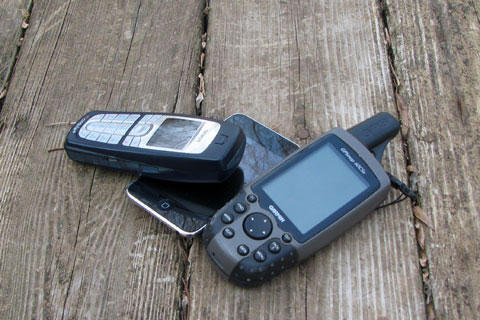| 347 | Hiking Skills - Missing Essentials - Communications |
2011-02-14 |

The Essentials (see below) for some reason omitted communication devices from the hallowed List; but in order to facilitate a timely rescue, some form of communication devices are often needed.
Stories of the misuse of communication devices are easy to find. For example... A hiker who was experiencing lightning near Mount Bierstadt activated his SPOT and then deactivated it -once he decided he was again safe. On his return to the trailhead, he was met by a team of rescuers organizing to rescue him ... Or, remember the hikers in Arizona that repeatedly called for a rescue basically because they were inexperienced. They were heavily fined. (Metro to Mountain)
Rescue workers are quick to praise communication devices when used properly, as being true life savers. Gone are the days where someone has to run hours or days to the nearest trailhead for help. Yet the power of communication devices is not without it's perils.
A few Communication hints ...
- A copy of the trip itinerary should be left with a responsible party. Contact that party with updates, changes, and when completed. Also, keep a copy of the itinerary with you - lest you forget.
- Carry signaling devices such as a whistle and a reflective coated blanket. Lightweight emergency blankets offer signaling capabilities. That is a lot of bang for just a few bucks.
- Phone service is at times surprisingly good. At other times it is surprisingly bad. Text messages can be sent when voice messages cannot.
- Electronic devices are only as good as their batteries. If you do not need the device, turn it off. Have a backup plan.
- Calling 911 is serious. If you call, do not hang up until they have all the needed information.
- One of the key pieces of information the 911 operator will need is your location. Some smart phones are GPS enabled, but a real GPS is still better. Location can also be derived from a map, but it takes a bit longer and is not as accurate.
- Know the phone number of the local rescue squad.
- A SPOT device is a satellite enabled communication device. Read the instructions for use. Once activated, the signal is tracked. Do not turn it off until you can contact the rescuers.
- Don't push the button unless you mean it.
- Communication devices do not make you a better outdoors person nor do they guarantee rescue.
- Before the trip discuss with your group worse case scenarios and how to respond.
- Learn hiking skills.
- How To Call 911 Effectively, an About article.
Be safe.
Happy communication trails
Links to Essentials
